
Updated Most Popular Websites Offering Montage Audio Archives for 2024

“Most Popular Websites Offering Montage Audio Archives”
In music, montage is a technique whereby newly branded compositions or sound objects, such as songs, are created from montage or collage. We will give you all the information you need to know before going for a montage music download. We will also highlight where you can get music tracks to add to your montage video.
Things to Be Aware of Before Downloading Montage Music
Before you download montage music, you must factor in the following crucial things:
1. The Storage Space Available on Your Target Device
Unlike documents, montage music takes loads of space. If you plan to download many tracks, you might run out of disk space if your device has limited storage space. For this reason, before you start looking for downloadable montage music, check if you have ample space on your target drive.
If your disk space is almost depleted, you can delete some files that you rarely use or back them up in another drive. You can also uninstall apps or programs that you rarely use but are readily available online. If you are using your mobile device to download montage music, you can expand the memory.
2. The Safety of Your Device
When looking for free downloadable montage music, you have to factor in the safety of your device. Attacks by cybercriminals are now targeting individuals. Be extra vigilant with the platforms you choose. The site you pick should have a good reputation in dealing with threats.
Before you download montage music, you need to consider the site you are getting them from: Not all sites are equal in quality and legality; some may be more reliable.
Do your research before downloading montage music from any site. Ensure the website is legit to avoid downloading files with malware or viruses.
3. Internet Connectivity
You’ll need a strong internet connection to montage music download. Most people use mobile phone contracts with specific data caps that do not allow venturing outside email or the usual social media connection.
If you download montage music using a phone contract, there’s a risk that you might exhaust the allocated data and incur additional charges. You should, therefore, understand when and where to download montage music.
If you’ve got free Wi-Fi at work, you might want to schedule all the montage music downloads and run them while doing your job. You can also download montage music using free Wi-Fi hubs around establishments like government facilities and hospitals. But, be extra careful with open Wi-Fi, as cybercriminals use this channel to hit targets.
4. The Copyright Status Of The Montage Music
When downloading montage music, it’s crucial to be aware of its copyright status. Some montage music tracks have copyright law protection, meaning downloading them will be violating the law.
Before you download any montage music online, read the download site’s terms and conditions. In turn, this will help you to understand what is allowed and what is not.
5. The Quality of the Montage Music File
Some montage music files you’ll find online are of low quality. And this can affect your audience’s listening experience. Before you get any downloadable montage music, check its quality.
Top 10 Websites to Download Montage Music
There are lots of sites where you can download montage music tracks. We’ll look at the top ten websites to find downloadable montage music.
1) Musopen
Dedicated to setting music free, Musopen provides free music to the public without copyright restrictions. The platform operates under a freemium model, meaning that some content is free to download while premium downloads need a subscription.
You can download sheet music for free. Non-paying users can also download five music recordings per day. If you pay $55 annually, you’ll receive unlimited downloads. Benefactors pay $240 per year, and they can request recordings.
You can download sheet music for free. The website offers recordings from 170 composers, and it has more than 100,000 downloadable montage music tracks.

2) StoryBlocks
StoryBlocks, a subscription-based audio/video stock, provides unlimited montage music download access to users looking for royalty-free content. Its library has more than 100,000 songs, and all the files you download are royalty-free. That means you can use them on your projects forever. You will keep all the music files you have downloaded even after canceling your membership.
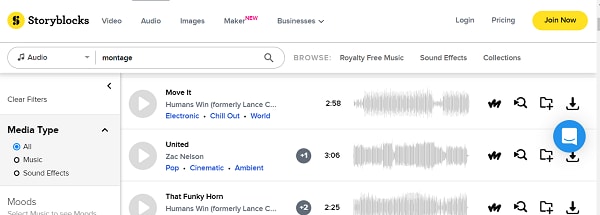
3) SoundCloud
SoundCloud is music sharing website audio and an online distribution platform that allows you to download montage music tracks after signing into your account. You’ll find the download file button under the waveform. The site is available in 190 countries and has more than 76 million active monthly users.
SoundCloud has more than 300 million tracks in its system. The site offers paid and free membership, available for desktop, mobile, and Xbox devices. It’s also easy to operate and features excellent navigation choices.

4) ccMixter
As a Produsage community music website, ccMixter promotes Cappella tracks, remixes, and samples licensed under Creative Commons available for re-use in creative works and downloads. Users can listen to, mash-up, sample or interact with music in various ways, including downloading and using tracks and samples in remixes. The website has more than 35,000 free music tracks that you can use if you give the artist credit. The site has some of the most popular audio formats, including Ogg, WMV, and mp3.

5) dig.ccMixter
dig.ccMixter is a subdomain of ccMixter, and it has tons of free montage. You can browse them by style, instrument, genre, and more. Use the search bar or the tag search page, which has a long list of various categories that help you narrow down your search. Music is available on this platform under an attribution license, meaning you can download any song you like and then give credit to the artist.
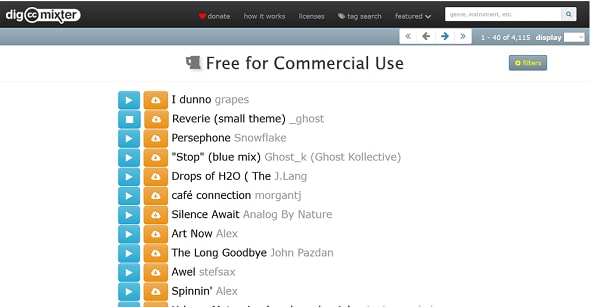
6) Incompetech
Incompetech offers copyrighted montage music. Every music on the website is under a CC-BY license, meaning you have to provide a link that directs your audience to Incompetech when using it. You can download and use songs for free with attribution or purchase them once and use them forever.
The site has an easy-to-use interface that allows you to find downloadable montage music fast. It also has a wide range of music from different genres and with different themes, including romance, western, adventure, and electronic.
The site’s filtering tools allow you to select several criteria to narrow your selection. You can choose a feel, such as mysterious, grooving, or aggressive, length, genre, tempo, or any combination that includes any of the two. You’ll get a short preview when you choose a piece of music. You can then download it with a click. What’s more? Incompetech gives you the full attribution, meaning you can copy and paste it when it is required.
Incompetech is the work of Kevin MacLeod, an American composer who has composed hundreds of thousands of songs and sound effects for free use.

7) FreeSound
While FreeSound’s site is not as intuitive or modern as the other options in this list, it has tons of montage music. The site also has natural sounds, people talking, noise, and sound effects. The best way to navigate the site is by using its tag list.
It also has a search bar function designed to help you find what you are searching for; each sound features an image associated with it, which is displayed on the category page, telling users the type of license the song has. While most tracks have CC-BY licenses, you’ll also find non-commercial options.
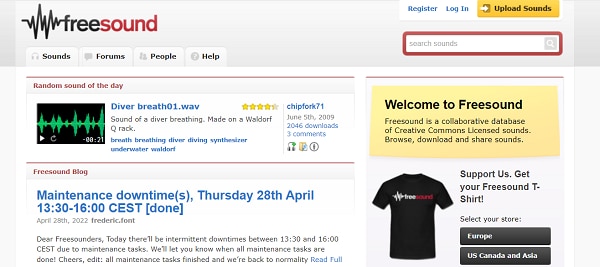
8) Free Music Archive
With more than 150,000 songs available on its platform, Free Music Archive (FMA) works with industry enthusiasts, artists, and radio stations to offer a great selection of free music. You can search by type of license, clip duration, or song title. You can also browse the hundreds of sub-genres and over a dozen genres available. Most of the music tracks are licensed under Creative Common, but you’ll also find some songs available for download.

9) Jamendo
The homepage of Jamendo offers two platforms: Licensing and Music. Jamendo Music, a streaming platform, has songs licensed under Creative Commons. Jamendo Creative Commons, on the other hand, offers royalty-free music that you can download for free. The site has more than 300,000 tracks in various formats.

10) Bensound
Bensound has thousands of royalty-free montage music, and you can browse the site by tags, popularity, genre, or uploading date or tags. The website includes works by composer Benjamin Tissot and other musicians.
Most songs are under Type CC BY-ND license. Therefore, you can use songs as free montage music, but you have to credit the website and never use them to make new songs or remix the tracks.

Wondershare Filmora11 Express Better
Achieve More
Grow Together
Free Download Free Download Learn More

Summarize:
These are the best source of getting downloadable montage music. You can use these platforms to download music and add it to your montage to make it more engaging and capture the attention of your audience.
Free Download Free Download Learn More

Summarize:
These are the best source of getting downloadable montage music. You can use these platforms to download music and add it to your montage to make it more engaging and capture the attention of your audience.
“Step-by-Step Audio Augmentation for Quality Video Files on QuickTime”
How to Add Audio to QuickTime Video Files

Shanoon Cox
Mar 27, 2024• Proven solutions
Sometimes you may want to replace the original audio of a QuickTime video or add your own audio file. Instead of compressing the video again, Wondershare Filmora (originally Wondershare Video Editor) makes it really easy to do this in just a few steps. Now follow the detailed guide below to learn how to easily add audio to QuickTime video files. You can download this software first:
How to Add Audio to QuickTime Video Files
 Download Mac Version ](https://tools.techidaily.com/wondershare/filmora/download/ )
Download Mac Version ](https://tools.techidaily.com/wondershare/filmora/download/ )
1 Import your QuickTime video files to the program
After you install this video editor, click the shortcut on the desktop to launch it. Then a window will pop up to let your select the aspect ratio between 16:9 and 4:3. After making your choice, click the “Import” button or drag and drop your QuickTime video & audio files to this program. Since this program supports a vast range of formats, you don’t have to convert the original video format to edit it.
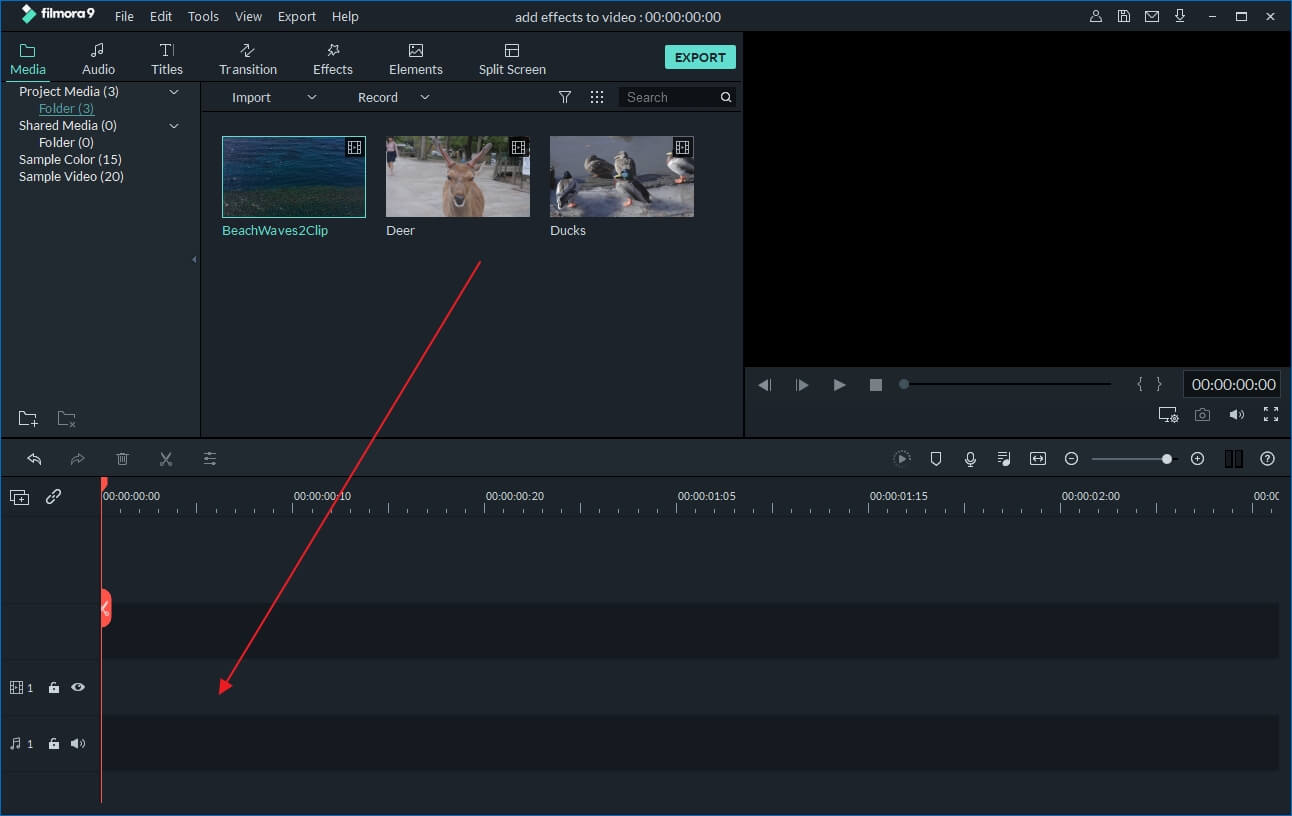
2 Add audio to QuickTime video files
After that, place both of the video and audio files to the corresponding tracks of the timeline. Make sure that the lengths of them are approximately the same. If not, you would need to edit the video and or audio streams (for example, deleting unnecessary fragments) in order to make their lengths equal. You can click the “Split” icon above the Timeline to split and cut the unwanted part of the files. After syncing the video and audio files perfectly, you can right click and further adjust the audio file in the editing panel, like changing the playing speed, volume, pitch, etc.
Tip: You can also replace the original soundtrack of the QuickTime video file. To do this, just right click the video file and choose “Audio Detach”. Then the audio file will appear on the audio track. Then right click the audio file and choose “Delete” to delete the audio.
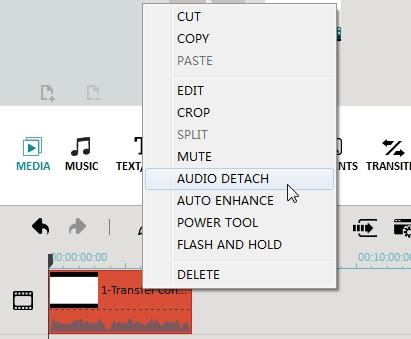
3 Export the new video file
After adding audio to the QuickTime video, hit the “Create” to export your video file. You can go to the “Format” tab to save the new video file in different formats. Or go to the “Device” tab if you want to watch the new file on your portable media device like iPod, iPhone, etc. There will be dozens of preset output profiles for converting your video file to almost every kind of media devices like iPod, iPhone, Xbox 360, mobile phones and different players. You can also directly share your video on YouTube or Facebook in the “YouTube” tab or burn to a DVD if you like.
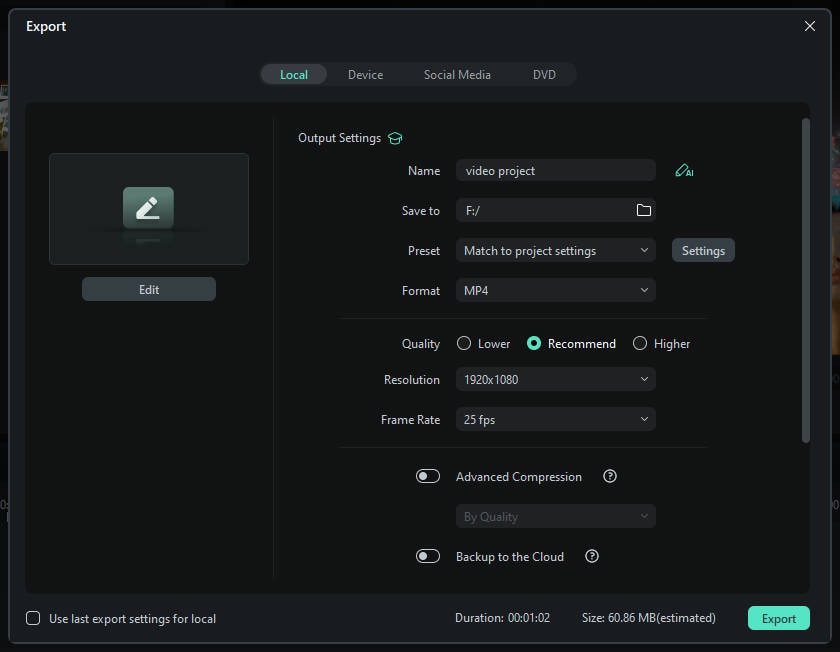
Watch the video below to check how to edit videos with Filmora video editor.
 Download Mac Version ](https://tools.techidaily.com/wondershare/filmora/download/ )
Download Mac Version ](https://tools.techidaily.com/wondershare/filmora/download/ )
You may also interested in: How to edit video with QuickTime

Shanoon Cox
Shanoon Cox is a writer and a lover of all things video.
Follow @Shanoon Cox
Shanoon Cox
Mar 27, 2024• Proven solutions
Sometimes you may want to replace the original audio of a QuickTime video or add your own audio file. Instead of compressing the video again, Wondershare Filmora (originally Wondershare Video Editor) makes it really easy to do this in just a few steps. Now follow the detailed guide below to learn how to easily add audio to QuickTime video files. You can download this software first:
How to Add Audio to QuickTime Video Files
 Download Mac Version ](https://tools.techidaily.com/wondershare/filmora/download/ )
Download Mac Version ](https://tools.techidaily.com/wondershare/filmora/download/ )
1 Import your QuickTime video files to the program
After you install this video editor, click the shortcut on the desktop to launch it. Then a window will pop up to let your select the aspect ratio between 16:9 and 4:3. After making your choice, click the “Import” button or drag and drop your QuickTime video & audio files to this program. Since this program supports a vast range of formats, you don’t have to convert the original video format to edit it.

2 Add audio to QuickTime video files
After that, place both of the video and audio files to the corresponding tracks of the timeline. Make sure that the lengths of them are approximately the same. If not, you would need to edit the video and or audio streams (for example, deleting unnecessary fragments) in order to make their lengths equal. You can click the “Split” icon above the Timeline to split and cut the unwanted part of the files. After syncing the video and audio files perfectly, you can right click and further adjust the audio file in the editing panel, like changing the playing speed, volume, pitch, etc.
Tip: You can also replace the original soundtrack of the QuickTime video file. To do this, just right click the video file and choose “Audio Detach”. Then the audio file will appear on the audio track. Then right click the audio file and choose “Delete” to delete the audio.

3 Export the new video file
After adding audio to the QuickTime video, hit the “Create” to export your video file. You can go to the “Format” tab to save the new video file in different formats. Or go to the “Device” tab if you want to watch the new file on your portable media device like iPod, iPhone, etc. There will be dozens of preset output profiles for converting your video file to almost every kind of media devices like iPod, iPhone, Xbox 360, mobile phones and different players. You can also directly share your video on YouTube or Facebook in the “YouTube” tab or burn to a DVD if you like.

Watch the video below to check how to edit videos with Filmora video editor.
 Download Mac Version ](https://tools.techidaily.com/wondershare/filmora/download/ )
Download Mac Version ](https://tools.techidaily.com/wondershare/filmora/download/ )
You may also interested in: How to edit video with QuickTime

Shanoon Cox
Shanoon Cox is a writer and a lover of all things video.
Follow @Shanoon Cox
Shanoon Cox
Mar 27, 2024• Proven solutions
Sometimes you may want to replace the original audio of a QuickTime video or add your own audio file. Instead of compressing the video again, Wondershare Filmora (originally Wondershare Video Editor) makes it really easy to do this in just a few steps. Now follow the detailed guide below to learn how to easily add audio to QuickTime video files. You can download this software first:
How to Add Audio to QuickTime Video Files
 Download Mac Version ](https://tools.techidaily.com/wondershare/filmora/download/ )
Download Mac Version ](https://tools.techidaily.com/wondershare/filmora/download/ )
1 Import your QuickTime video files to the program
After you install this video editor, click the shortcut on the desktop to launch it. Then a window will pop up to let your select the aspect ratio between 16:9 and 4:3. After making your choice, click the “Import” button or drag and drop your QuickTime video & audio files to this program. Since this program supports a vast range of formats, you don’t have to convert the original video format to edit it.

2 Add audio to QuickTime video files
After that, place both of the video and audio files to the corresponding tracks of the timeline. Make sure that the lengths of them are approximately the same. If not, you would need to edit the video and or audio streams (for example, deleting unnecessary fragments) in order to make their lengths equal. You can click the “Split” icon above the Timeline to split and cut the unwanted part of the files. After syncing the video and audio files perfectly, you can right click and further adjust the audio file in the editing panel, like changing the playing speed, volume, pitch, etc.
Tip: You can also replace the original soundtrack of the QuickTime video file. To do this, just right click the video file and choose “Audio Detach”. Then the audio file will appear on the audio track. Then right click the audio file and choose “Delete” to delete the audio.

3 Export the new video file
After adding audio to the QuickTime video, hit the “Create” to export your video file. You can go to the “Format” tab to save the new video file in different formats. Or go to the “Device” tab if you want to watch the new file on your portable media device like iPod, iPhone, etc. There will be dozens of preset output profiles for converting your video file to almost every kind of media devices like iPod, iPhone, Xbox 360, mobile phones and different players. You can also directly share your video on YouTube or Facebook in the “YouTube” tab or burn to a DVD if you like.

Watch the video below to check how to edit videos with Filmora video editor.
 Download Mac Version ](https://tools.techidaily.com/wondershare/filmora/download/ )
Download Mac Version ](https://tools.techidaily.com/wondershare/filmora/download/ )
You may also interested in: How to edit video with QuickTime

Shanoon Cox
Shanoon Cox is a writer and a lover of all things video.
Follow @Shanoon Cox
Shanoon Cox
Mar 27, 2024• Proven solutions
Sometimes you may want to replace the original audio of a QuickTime video or add your own audio file. Instead of compressing the video again, Wondershare Filmora (originally Wondershare Video Editor) makes it really easy to do this in just a few steps. Now follow the detailed guide below to learn how to easily add audio to QuickTime video files. You can download this software first:
How to Add Audio to QuickTime Video Files
 Download Mac Version ](https://tools.techidaily.com/wondershare/filmora/download/ )
Download Mac Version ](https://tools.techidaily.com/wondershare/filmora/download/ )
1 Import your QuickTime video files to the program
After you install this video editor, click the shortcut on the desktop to launch it. Then a window will pop up to let your select the aspect ratio between 16:9 and 4:3. After making your choice, click the “Import” button or drag and drop your QuickTime video & audio files to this program. Since this program supports a vast range of formats, you don’t have to convert the original video format to edit it.

2 Add audio to QuickTime video files
After that, place both of the video and audio files to the corresponding tracks of the timeline. Make sure that the lengths of them are approximately the same. If not, you would need to edit the video and or audio streams (for example, deleting unnecessary fragments) in order to make their lengths equal. You can click the “Split” icon above the Timeline to split and cut the unwanted part of the files. After syncing the video and audio files perfectly, you can right click and further adjust the audio file in the editing panel, like changing the playing speed, volume, pitch, etc.
Tip: You can also replace the original soundtrack of the QuickTime video file. To do this, just right click the video file and choose “Audio Detach”. Then the audio file will appear on the audio track. Then right click the audio file and choose “Delete” to delete the audio.

3 Export the new video file
After adding audio to the QuickTime video, hit the “Create” to export your video file. You can go to the “Format” tab to save the new video file in different formats. Or go to the “Device” tab if you want to watch the new file on your portable media device like iPod, iPhone, etc. There will be dozens of preset output profiles for converting your video file to almost every kind of media devices like iPod, iPhone, Xbox 360, mobile phones and different players. You can also directly share your video on YouTube or Facebook in the “YouTube” tab or burn to a DVD if you like.

Watch the video below to check how to edit videos with Filmora video editor.
 Download Mac Version ](https://tools.techidaily.com/wondershare/filmora/download/ )
Download Mac Version ](https://tools.techidaily.com/wondershare/filmora/download/ )
You may also interested in: How to edit video with QuickTime

Shanoon Cox
Shanoon Cox is a writer and a lover of all things video.
Follow @Shanoon Cox
Crafting Silent Elegance: The Art of Audio Ducking in Video Editing with Adobe Premiere Pro on Mac
Tutorial on Audio Ducking in Adobe Premiere Pro on Mac

Benjamin Arango
Oct 26, 2023• Proven solutions
Too many times, while mixing voiceover with the background music in a video, the dialogues don’t seem to be audible. That’s when we follow the process of audio ducking in Premiere Pro that would automatically lower the volume of the background music whenever there is a dialogue.
The best thing about Premiere Pro audio ducking is that it is an automatic process and we don’t need to put a lot of effort. To make your job easier, I’m going to let you know how to use the Adobe Premiere Pro audio ducking feature in a step by step manner in this guide.
Part 1: How to Use Audio Ducking to Balance Music and Voiceover in Adobe Premiere Pro on Mac?
If you have been using Adobe Premiere Pro on Mac, then you would already be familiar with the wide range of editing features that it has. One of them is the Premiere Pro audio ducking option that comes inbuilt in the application. Using it, you can automatically lower the volume of the background music and amplify your dialogues.
To perform auto-ducking in Premiere Pro, we first need to define each audio track and then use the ducking feature. Here’s how you can also perform audio ducking in Premiere Pro like a pro.
Step 1: Define the Audio Types
Since Adobe Premiere Pro can’t automatically detect the type of sounds, you need to do it manually. To do audio ducking in Premiere Pro, you can first import your video clip and the voiceover to the application, and drag them to the working timeline.
Now, you can first select the voiceover file that you want to amplify, and from the sidebar on the right, click on “Dialogue” as the type of the audio file.
Once you mark the audio type, you will get different options. Here, go to the “Loudness” option and click on the “Auto Match” button.
Afterward, you can do the same for your background audio file. Select the file and choose its audio type as “Music”. You can also set its loudness to “Auto Match” if you want to.
Step 2: Perform Auto Ducking in Premiere Pro
Now when you have set the audio types, you can just find the Ducking option on the sidebar and turn it on. Here, you can first click on the dialogue icon from the top and get the needed options. You can adjust its sensitivity and set a level or improve or reduce its quality.
Apart from the dialogue icon, you can also click on the Music icon and do the same. For instance, you can reduce the quality of the background music and increase the level of the dialogue track.
Step 3: Make the Final Changes
Great! You can now preview the changes you have made and check the audio ducking results in Premiere Pro. If you want to finalize things, then you can perform keyframing and manually adjust the volume.
Furthermore, you can also perform an instant hard ducking in Premiere Pro. For this, just choose the track, go to the side panel, and select Preset > Music > Hard Vocal Ducking. While it would get instant results in Adobe Premiere audio ducking, the results might not be so effective.
Part 2: Wondershare Filmora
As you can see, the Premiere Pro audio ducking feature can get a bit complicated if you are a beginner. Therefore, if you are looking for a simpler and more effective automatic ducking solution, then use Wondershare Filmora. This intuitive and diverse video/audio editing tool has an automatic audio ducking option that would make your job a whole lot easier.
To learn how to perform automatic audio ducking in your videos on Mac via Wondershare Filmora, one can follow these steps:
Step 1: Load the Video or Audio Files on Filmora
Firstly, you can just launch Wondershare Filmora on your Mac and import your videos/audios. You can drag and drop the files or just go to its Import Menu option to browse the files. Afterward, you can drag the files to the timeline at the bottom to work on them.
On the native interface of Filmora, you can also directly record voiceovers. Just click on the voiceover icon (below the preview window) and start recording any dialogue.
Not just that, you can also find a wide range of royalty-free music on Filmora that you can readily use in your projects without any copyright issues.
Step 2: Perform Automatic Audio Ducking on Filmora
Great! Now you can see your video and the audio track on the timeline of Filmora. At first, you need to select the voiceover (or any other track) that you want to amplify.
Once the desired audio track is selected, right-click it, and choose the “Adjust Audio” option.
As the dedicated Audio Editor will open, just go to the “Ducking” option at the bottom and turn on the “Lower the volume of other clips” feature. You can further select the level to lower the volume of other background clips in the video here.
Step 3: Save and Export Your Video
That’s it! After making the changes, just click on the “OK” button and Filmora would automatically adjust the volume of other clips. You can further make the needed changes in the video and click on the “Export” icon. This will let you save the project in the desired format and resolution on your computer.
Who knew it would be so easy to do auto-ducking in Premiere Pro, right? Though, if you are looking for even a simpler alternative to Adobe Premiere audio ducking, then consider using Wondershare Filmora. A user-friendly and resourceful video editor, it offers a wide range of features and other inbuilt tools that would meet every post-production requirement of yours in one place.

Benjamin Arango
Benjamin Arango is a writer and a lover of all things video.
Follow @Benjamin Arango
Benjamin Arango
Oct 26, 2023• Proven solutions
Too many times, while mixing voiceover with the background music in a video, the dialogues don’t seem to be audible. That’s when we follow the process of audio ducking in Premiere Pro that would automatically lower the volume of the background music whenever there is a dialogue.
The best thing about Premiere Pro audio ducking is that it is an automatic process and we don’t need to put a lot of effort. To make your job easier, I’m going to let you know how to use the Adobe Premiere Pro audio ducking feature in a step by step manner in this guide.
Part 1: How to Use Audio Ducking to Balance Music and Voiceover in Adobe Premiere Pro on Mac?
If you have been using Adobe Premiere Pro on Mac, then you would already be familiar with the wide range of editing features that it has. One of them is the Premiere Pro audio ducking option that comes inbuilt in the application. Using it, you can automatically lower the volume of the background music and amplify your dialogues.
To perform auto-ducking in Premiere Pro, we first need to define each audio track and then use the ducking feature. Here’s how you can also perform audio ducking in Premiere Pro like a pro.
Step 1: Define the Audio Types
Since Adobe Premiere Pro can’t automatically detect the type of sounds, you need to do it manually. To do audio ducking in Premiere Pro, you can first import your video clip and the voiceover to the application, and drag them to the working timeline.
Now, you can first select the voiceover file that you want to amplify, and from the sidebar on the right, click on “Dialogue” as the type of the audio file.
Once you mark the audio type, you will get different options. Here, go to the “Loudness” option and click on the “Auto Match” button.
Afterward, you can do the same for your background audio file. Select the file and choose its audio type as “Music”. You can also set its loudness to “Auto Match” if you want to.
Step 2: Perform Auto Ducking in Premiere Pro
Now when you have set the audio types, you can just find the Ducking option on the sidebar and turn it on. Here, you can first click on the dialogue icon from the top and get the needed options. You can adjust its sensitivity and set a level or improve or reduce its quality.
Apart from the dialogue icon, you can also click on the Music icon and do the same. For instance, you can reduce the quality of the background music and increase the level of the dialogue track.
Step 3: Make the Final Changes
Great! You can now preview the changes you have made and check the audio ducking results in Premiere Pro. If you want to finalize things, then you can perform keyframing and manually adjust the volume.
Furthermore, you can also perform an instant hard ducking in Premiere Pro. For this, just choose the track, go to the side panel, and select Preset > Music > Hard Vocal Ducking. While it would get instant results in Adobe Premiere audio ducking, the results might not be so effective.
Part 2: Wondershare Filmora
As you can see, the Premiere Pro audio ducking feature can get a bit complicated if you are a beginner. Therefore, if you are looking for a simpler and more effective automatic ducking solution, then use Wondershare Filmora. This intuitive and diverse video/audio editing tool has an automatic audio ducking option that would make your job a whole lot easier.
To learn how to perform automatic audio ducking in your videos on Mac via Wondershare Filmora, one can follow these steps:
Step 1: Load the Video or Audio Files on Filmora
Firstly, you can just launch Wondershare Filmora on your Mac and import your videos/audios. You can drag and drop the files or just go to its Import Menu option to browse the files. Afterward, you can drag the files to the timeline at the bottom to work on them.
On the native interface of Filmora, you can also directly record voiceovers. Just click on the voiceover icon (below the preview window) and start recording any dialogue.
Not just that, you can also find a wide range of royalty-free music on Filmora that you can readily use in your projects without any copyright issues.
Step 2: Perform Automatic Audio Ducking on Filmora
Great! Now you can see your video and the audio track on the timeline of Filmora. At first, you need to select the voiceover (or any other track) that you want to amplify.
Once the desired audio track is selected, right-click it, and choose the “Adjust Audio” option.
As the dedicated Audio Editor will open, just go to the “Ducking” option at the bottom and turn on the “Lower the volume of other clips” feature. You can further select the level to lower the volume of other background clips in the video here.
Step 3: Save and Export Your Video
That’s it! After making the changes, just click on the “OK” button and Filmora would automatically adjust the volume of other clips. You can further make the needed changes in the video and click on the “Export” icon. This will let you save the project in the desired format and resolution on your computer.
Who knew it would be so easy to do auto-ducking in Premiere Pro, right? Though, if you are looking for even a simpler alternative to Adobe Premiere audio ducking, then consider using Wondershare Filmora. A user-friendly and resourceful video editor, it offers a wide range of features and other inbuilt tools that would meet every post-production requirement of yours in one place.

Benjamin Arango
Benjamin Arango is a writer and a lover of all things video.
Follow @Benjamin Arango
Benjamin Arango
Oct 26, 2023• Proven solutions
Too many times, while mixing voiceover with the background music in a video, the dialogues don’t seem to be audible. That’s when we follow the process of audio ducking in Premiere Pro that would automatically lower the volume of the background music whenever there is a dialogue.
The best thing about Premiere Pro audio ducking is that it is an automatic process and we don’t need to put a lot of effort. To make your job easier, I’m going to let you know how to use the Adobe Premiere Pro audio ducking feature in a step by step manner in this guide.
Part 1: How to Use Audio Ducking to Balance Music and Voiceover in Adobe Premiere Pro on Mac?
If you have been using Adobe Premiere Pro on Mac, then you would already be familiar with the wide range of editing features that it has. One of them is the Premiere Pro audio ducking option that comes inbuilt in the application. Using it, you can automatically lower the volume of the background music and amplify your dialogues.
To perform auto-ducking in Premiere Pro, we first need to define each audio track and then use the ducking feature. Here’s how you can also perform audio ducking in Premiere Pro like a pro.
Step 1: Define the Audio Types
Since Adobe Premiere Pro can’t automatically detect the type of sounds, you need to do it manually. To do audio ducking in Premiere Pro, you can first import your video clip and the voiceover to the application, and drag them to the working timeline.
Now, you can first select the voiceover file that you want to amplify, and from the sidebar on the right, click on “Dialogue” as the type of the audio file.
Once you mark the audio type, you will get different options. Here, go to the “Loudness” option and click on the “Auto Match” button.
Afterward, you can do the same for your background audio file. Select the file and choose its audio type as “Music”. You can also set its loudness to “Auto Match” if you want to.
Step 2: Perform Auto Ducking in Premiere Pro
Now when you have set the audio types, you can just find the Ducking option on the sidebar and turn it on. Here, you can first click on the dialogue icon from the top and get the needed options. You can adjust its sensitivity and set a level or improve or reduce its quality.
Apart from the dialogue icon, you can also click on the Music icon and do the same. For instance, you can reduce the quality of the background music and increase the level of the dialogue track.
Step 3: Make the Final Changes
Great! You can now preview the changes you have made and check the audio ducking results in Premiere Pro. If you want to finalize things, then you can perform keyframing and manually adjust the volume.
Furthermore, you can also perform an instant hard ducking in Premiere Pro. For this, just choose the track, go to the side panel, and select Preset > Music > Hard Vocal Ducking. While it would get instant results in Adobe Premiere audio ducking, the results might not be so effective.
Part 2: Wondershare Filmora
As you can see, the Premiere Pro audio ducking feature can get a bit complicated if you are a beginner. Therefore, if you are looking for a simpler and more effective automatic ducking solution, then use Wondershare Filmora. This intuitive and diverse video/audio editing tool has an automatic audio ducking option that would make your job a whole lot easier.
To learn how to perform automatic audio ducking in your videos on Mac via Wondershare Filmora, one can follow these steps:
Step 1: Load the Video or Audio Files on Filmora
Firstly, you can just launch Wondershare Filmora on your Mac and import your videos/audios. You can drag and drop the files or just go to its Import Menu option to browse the files. Afterward, you can drag the files to the timeline at the bottom to work on them.
On the native interface of Filmora, you can also directly record voiceovers. Just click on the voiceover icon (below the preview window) and start recording any dialogue.
Not just that, you can also find a wide range of royalty-free music on Filmora that you can readily use in your projects without any copyright issues.
Step 2: Perform Automatic Audio Ducking on Filmora
Great! Now you can see your video and the audio track on the timeline of Filmora. At first, you need to select the voiceover (or any other track) that you want to amplify.
Once the desired audio track is selected, right-click it, and choose the “Adjust Audio” option.
As the dedicated Audio Editor will open, just go to the “Ducking” option at the bottom and turn on the “Lower the volume of other clips” feature. You can further select the level to lower the volume of other background clips in the video here.
Step 3: Save and Export Your Video
That’s it! After making the changes, just click on the “OK” button and Filmora would automatically adjust the volume of other clips. You can further make the needed changes in the video and click on the “Export” icon. This will let you save the project in the desired format and resolution on your computer.
Who knew it would be so easy to do auto-ducking in Premiere Pro, right? Though, if you are looking for even a simpler alternative to Adobe Premiere audio ducking, then consider using Wondershare Filmora. A user-friendly and resourceful video editor, it offers a wide range of features and other inbuilt tools that would meet every post-production requirement of yours in one place.

Benjamin Arango
Benjamin Arango is a writer and a lover of all things video.
Follow @Benjamin Arango
Benjamin Arango
Oct 26, 2023• Proven solutions
Too many times, while mixing voiceover with the background music in a video, the dialogues don’t seem to be audible. That’s when we follow the process of audio ducking in Premiere Pro that would automatically lower the volume of the background music whenever there is a dialogue.
The best thing about Premiere Pro audio ducking is that it is an automatic process and we don’t need to put a lot of effort. To make your job easier, I’m going to let you know how to use the Adobe Premiere Pro audio ducking feature in a step by step manner in this guide.
Part 1: How to Use Audio Ducking to Balance Music and Voiceover in Adobe Premiere Pro on Mac?
If you have been using Adobe Premiere Pro on Mac, then you would already be familiar with the wide range of editing features that it has. One of them is the Premiere Pro audio ducking option that comes inbuilt in the application. Using it, you can automatically lower the volume of the background music and amplify your dialogues.
To perform auto-ducking in Premiere Pro, we first need to define each audio track and then use the ducking feature. Here’s how you can also perform audio ducking in Premiere Pro like a pro.
Step 1: Define the Audio Types
Since Adobe Premiere Pro can’t automatically detect the type of sounds, you need to do it manually. To do audio ducking in Premiere Pro, you can first import your video clip and the voiceover to the application, and drag them to the working timeline.
Now, you can first select the voiceover file that you want to amplify, and from the sidebar on the right, click on “Dialogue” as the type of the audio file.
Once you mark the audio type, you will get different options. Here, go to the “Loudness” option and click on the “Auto Match” button.
Afterward, you can do the same for your background audio file. Select the file and choose its audio type as “Music”. You can also set its loudness to “Auto Match” if you want to.
Step 2: Perform Auto Ducking in Premiere Pro
Now when you have set the audio types, you can just find the Ducking option on the sidebar and turn it on. Here, you can first click on the dialogue icon from the top and get the needed options. You can adjust its sensitivity and set a level or improve or reduce its quality.
Apart from the dialogue icon, you can also click on the Music icon and do the same. For instance, you can reduce the quality of the background music and increase the level of the dialogue track.
Step 3: Make the Final Changes
Great! You can now preview the changes you have made and check the audio ducking results in Premiere Pro. If you want to finalize things, then you can perform keyframing and manually adjust the volume.
Furthermore, you can also perform an instant hard ducking in Premiere Pro. For this, just choose the track, go to the side panel, and select Preset > Music > Hard Vocal Ducking. While it would get instant results in Adobe Premiere audio ducking, the results might not be so effective.
Part 2: Wondershare Filmora
As you can see, the Premiere Pro audio ducking feature can get a bit complicated if you are a beginner. Therefore, if you are looking for a simpler and more effective automatic ducking solution, then use Wondershare Filmora. This intuitive and diverse video/audio editing tool has an automatic audio ducking option that would make your job a whole lot easier.
To learn how to perform automatic audio ducking in your videos on Mac via Wondershare Filmora, one can follow these steps:
Step 1: Load the Video or Audio Files on Filmora
Firstly, you can just launch Wondershare Filmora on your Mac and import your videos/audios. You can drag and drop the files or just go to its Import Menu option to browse the files. Afterward, you can drag the files to the timeline at the bottom to work on them.
On the native interface of Filmora, you can also directly record voiceovers. Just click on the voiceover icon (below the preview window) and start recording any dialogue.
Not just that, you can also find a wide range of royalty-free music on Filmora that you can readily use in your projects without any copyright issues.
Step 2: Perform Automatic Audio Ducking on Filmora
Great! Now you can see your video and the audio track on the timeline of Filmora. At first, you need to select the voiceover (or any other track) that you want to amplify.
Once the desired audio track is selected, right-click it, and choose the “Adjust Audio” option.
As the dedicated Audio Editor will open, just go to the “Ducking” option at the bottom and turn on the “Lower the volume of other clips” feature. You can further select the level to lower the volume of other background clips in the video here.
Step 3: Save and Export Your Video
That’s it! After making the changes, just click on the “OK” button and Filmora would automatically adjust the volume of other clips. You can further make the needed changes in the video and click on the “Export” icon. This will let you save the project in the desired format and resolution on your computer.
Who knew it would be so easy to do auto-ducking in Premiere Pro, right? Though, if you are looking for even a simpler alternative to Adobe Premiere audio ducking, then consider using Wondershare Filmora. A user-friendly and resourceful video editor, it offers a wide range of features and other inbuilt tools that would meet every post-production requirement of yours in one place.

Benjamin Arango
Benjamin Arango is a writer and a lover of all things video.
Follow @Benjamin Arango
Also read:
- [New] Discover the Crème De La Crème of Mac Snipers for 2024
- [Updated] 2024 Approved Ace Google Meet Selecting Ideal Video Call BGs
- 2024 Approved Chromebook Users Companion to Launching and Deleting Audacity
- 2024 Approved The A-List of Audio Harvesters 10 Indispensable Tools to Master Your Sound Design
- 2024 Approved The Art of Title Design in After Effects
- Accelerating Expertise in Social Media Strategies with Reddit Guidance for 2024
- Catch or Beat Sleeping Snorlax on Pokemon Go For Poco X6 | Dr.fone
- Comment Reconstruire Et Recuperer Des Données À Partir D'Un RAID Casse
- Cutting Corners with Care 10+ Top-Ranked Free Audio Editors Online for 2024
- Enhancing Creativity with GPT-4 and the Power of DALL-E
- Free Online JPG/GIF Converters The Best 10 List
- In 2024, How to Track Tecno Spark 10 5G Location by Number | Dr.fone
- Mastering the Solution for STOP Error 0X0000003D: Expert Tips and Techniques
- New Essential Knowledge for Compiling a Top-Notch Auditory Archive on YouTube
- Seeking Out Elaborate Zombie Soundtracks for 2024
- Updated 2024 Approved How to Convert Your Vocal Sessions Into Pristine MP3 Files The Best 5 Recorders Reviewed
- Updated 2024 Approved Tailoring Auditory Experiences to Your Videos with Ease and Precision
- Updated In 2024, Apowersoft Audio Recorder Tutorial and 4 Alternatives
- Updated Silent Film Techniques How to Minimize Background Noise in Your Mac iMovie Projects for 2024
- Title: Updated Most Popular Websites Offering Montage Audio Archives for 2024
- Author: Ella
- Created at : 2025-02-25 10:02:50
- Updated at : 2025-03-03 17:40:21
- Link: https://sound-optimizing.techidaily.com/updated-most-popular-websites-offering-montage-audio-archives-for-2024/
- License: This work is licensed under CC BY-NC-SA 4.0.

